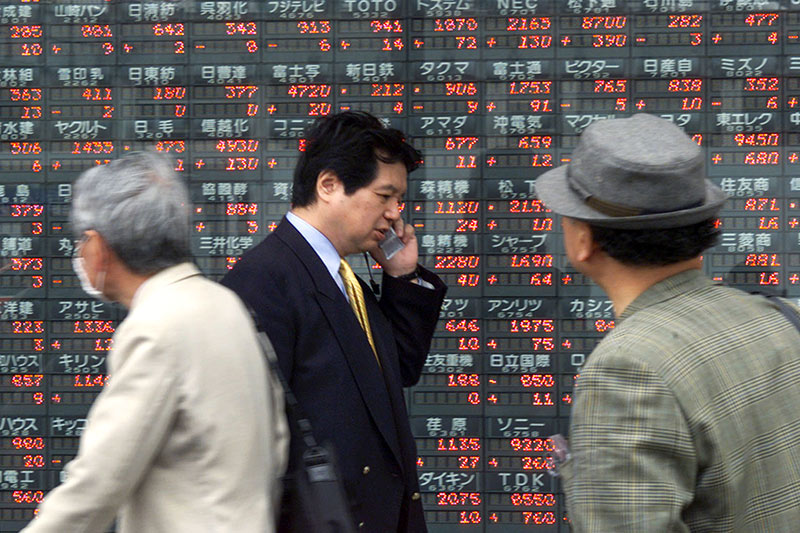Investing.com - Stocks were broadly higher in Thursday’s Asian after another positive economic data point out of China reminded investors the world’s second-largest economy is turning around.
In Asian trading Thursday, Japan’s Nikkei 225 climbed 0.74%. Japanese stocks were again lead higher by exporters after the yen faltered against the major currencies as Prime Minister Shinzo Abe reiterated his call for the Bank of Japan to raise its inflation target to 2%.
Hong Kong’s Hang Seng rose 0.89% and the Shanghai Composite added 0.46% after China’s customs office said in a report s exports rose 14.1% last month from a year earlier while imports increased 6%. Analysts expected exports to rise just 5%.
The U.S. is China’s largest export destination followed by the European Union. China releases its inflation numbers on Friday and its fourth-quarter GDP result on January 18.
Australia's S&P/ASX 200 was lifted by the China news as well because China is one of Australia's top trading partners. The headlines helped boost materials and mining shares, enabling Aussie stocks to fight off another glum data point.
In a report, the Australian Bureau of Statistics said that Australian Building Approvals rose to a seasonally adjusted 2.9%, from -5.1% in the preceding week whose figure was revised up from -7.6%. Analysts had expected Australian Building Approvals to rise to 5.0% last week.
Elsewhere, New Zealand’s NZSE 50 added 0.27%, indicating that traders were perhaps more focused on China than another New Zealand data point. New Zealand’s trade balance rose less-than-expected last month, data showed on Wednesday.
In a report, Statistics New Zealand said that the trade balance rose to a seasonally adjusted -700M, from -718M in the preceding month. Analysts had expected the trade balance to rise to -620M last month.
Meanwhile, South Korea’s Kospi added 0.52% while Singapore’s Straits Times Index rose 0.4%. S&P 500 futures climbed 0.19%.
In Asian trading Thursday, Japan’s Nikkei 225 climbed 0.74%. Japanese stocks were again lead higher by exporters after the yen faltered against the major currencies as Prime Minister Shinzo Abe reiterated his call for the Bank of Japan to raise its inflation target to 2%.
Hong Kong’s Hang Seng rose 0.89% and the Shanghai Composite added 0.46% after China’s customs office said in a report s exports rose 14.1% last month from a year earlier while imports increased 6%. Analysts expected exports to rise just 5%.
The U.S. is China’s largest export destination followed by the European Union. China releases its inflation numbers on Friday and its fourth-quarter GDP result on January 18.
Australia's S&P/ASX 200 was lifted by the China news as well because China is one of Australia's top trading partners. The headlines helped boost materials and mining shares, enabling Aussie stocks to fight off another glum data point.
In a report, the Australian Bureau of Statistics said that Australian Building Approvals rose to a seasonally adjusted 2.9%, from -5.1% in the preceding week whose figure was revised up from -7.6%. Analysts had expected Australian Building Approvals to rise to 5.0% last week.
Elsewhere, New Zealand’s NZSE 50 added 0.27%, indicating that traders were perhaps more focused on China than another New Zealand data point. New Zealand’s trade balance rose less-than-expected last month, data showed on Wednesday.
In a report, Statistics New Zealand said that the trade balance rose to a seasonally adjusted -700M, from -718M in the preceding month. Analysts had expected the trade balance to rise to -620M last month.
Meanwhile, South Korea’s Kospi added 0.52% while Singapore’s Straits Times Index rose 0.4%. S&P 500 futures climbed 0.19%.
